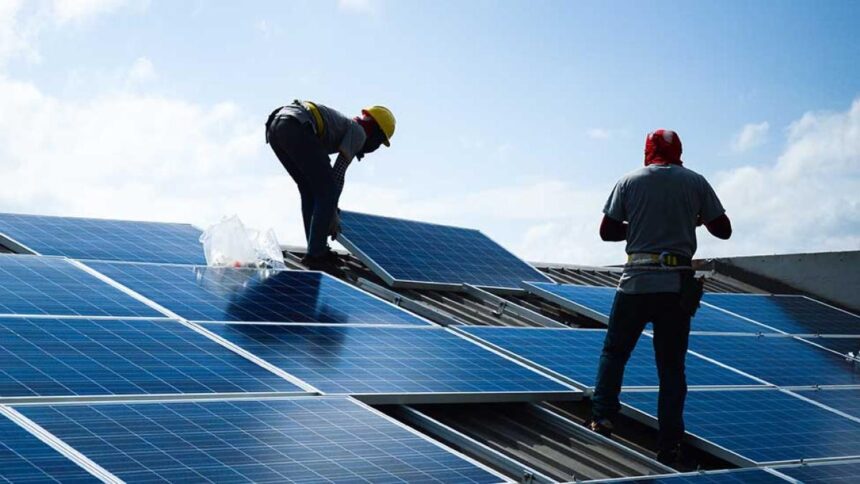Introduction
Transitioning to solar energy is a smart, sustainable choice that reduces electricity costs and environmental impact. However, the success of a solar energy system depends heavily on the expertise of your solar panel installer. Selecting a qualified installer ensures your system is safe, efficient, and long-lasting.
A professional solar panel installation is a complex process that involves site assessment, system design, obtaining permits, and precise installation techniques. Mistakes can lead to poor performance, higher costs, or even safety hazards. This guide will help you understand the role of a solar panel installer , how to choose the right one, and what to expect during the installation process.
- The Role of a Solar Panel Installer
A solar panel installer is a trained professional who manages the physical installation of solar panels and associated equipment on your property. Their duties typically include:
- Inspecting your roof or installation site for suitability
- Planning the layout of panels for optimal sun exposure
- Mounting solar panels securely and safely
- Connecting panels to the inverter and electrical system
- Ensuring compliance with local electrical codes and regulations
- Testing the system for proper function
- Advising on maintenance and safety
In addition to hands-on work, many installers coordinate with utility companies and local authorities to secure permits and inspections, making the entire installation seamless.
- Qualifications and Certifications to Look For
Not every contractor can claim to be a competent solar panel installer. Here’s what to look for when vetting professionals:
a. Certification
The North American Board of Certified Energy Practitioners (NABCEP) certification is widely recognized as a gold standard in the solar industry. Installers with NABCEP certification have undergone rigorous training and testing, ensuring expertise and professionalism.
b. Licensing and Insurance
Verify that the installer holds all required state and local licenses for electrical and solar work. Adequate insurance coverage protects you from liability in case of accidents or damage during installation.
c. Experience
Ask how many installations the installer has completed and whether they specialize in residential, commercial, or both types of projects. Experienced installers are better equipped to handle unforeseen challenges.
- How to Choose the Right Solar Panel Installer
Finding the right installer means balancing quality, price, and service.
a. Research and Reviews
Start by researching local and national installers with strong reputations. Check online reviews on platforms like Google, Yelp, and specialized solar forums. Look for consistent positive feedback and responsiveness to customer concerns.
b. Multiple Quotes
Obtain several quotes to compare pricing, warranties, and included services. Beware of quotes that are significantly lower than others—they might cut corners or use inferior equipment.
c. Detailed Proposals
A professional installer provides a clear, detailed proposal outlining system size, panel brands, expected energy production, costs, warranties, and project timelines. Avoid vague or rushed estimates.
d. Communication and Support
Choose an installer who communicates clearly, answers your questions, and provides ongoing support after installation.
- The Installation Process
Knowing the typical steps your solar panel installer will follow can help set expectations:
a. Site Assessment
A thorough assessment evaluates roof condition, shading, orientation, and structural capacity. This step ensures your property can safely and effectively support solar panels.
b. System Design
Based on the site data and your energy needs, the installer designs a system optimized for performance and aesthetics.
c. Permitting
The installer manages the paperwork and approvals required by local authorities and your utility company.
d. Installation
This includes mounting panels, wiring, and connecting the system to your electrical panel. Installers ensure all components are securely fixed and compliant with safety standards.
e. Inspection and Activation
Once installed, the system undergoes inspection by local authorities. After approval, the system can be activated and start generating electricity.
- Common Challenges and How Installers Overcome Them
Even the best installers face challenges such as:
- Roof condition issues: Some roofs may need repairs or reinforcements before installation.
- Shading obstacles: Trees, chimneys, or nearby buildings may reduce solar efficiency; installers find solutions such as panel placement adjustments or trimming.
- Permitting delays: Navigating local regulations can be time-consuming; experienced installers handle this smoothly.
- Weather conditions: Installation schedules may adjust for safety and quality during adverse weather.
- Warranty and Maintenance Considerations
A reliable solar panel installer offers warranties on workmanship and installation, typically ranging from 5 to 10 years. Additionally, most solar panels come with manufacturer warranties of 20 to 25 years.
Regular maintenance, such as cleaning panels and checking electrical components, helps maximize system efficiency. Many installers offer maintenance packages or system monitoring services.
- Benefits of Hiring a Professional Solar Panel Installer
- Safety: Trained installers minimize risks associated with electrical work and roof access.
- Optimal Performance: Proper installation ensures maximum energy generation.
- Code Compliance: Professionals adhere to building and electrical codes, avoiding legal and insurance issues.
- Cost Efficiency: Correct installation reduces costly repairs and energy losses.
- Support: Access to expert advice and troubleshooting post-installation.
- DIY Installation vs. Professional Installer
While some homeowners consider DIY solar panel installation, it is generally not recommended due to:
- Complexity of electrical work and code compliance
- Risk of improper installation leading to system failure or hazards
- Potential voiding of manufacturer warranties
- Time-consuming nature without specialized tools and experience
Hiring a certified solar panel installer in Westminster ensures a safe, high-quality installation with long-term peace of mind.
Conclusion
Choosing the right solar panel installer is essential for maximizing the benefits of your solar energy system. From initial site assessment to final activation, a professional installer ensures that your system is safe, efficient, and reliable.
Careful research, verification of certifications, clear communication, and a detailed proposal will help you find an installer you can trust. Investing in professional installation safeguards your investment and helps you enjoy the financial and environmental advantages of solar energy for years to come.


